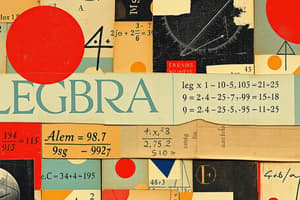Podcast
Questions and Answers
What is an ordered pair?
What is an ordered pair?
- A pair of numbers written in brackets with no specific order
- A pair of numbers written in parentheses where order is important (correct)
- A single number written in multiple forms
- A pair of numbers displayed in a table
When two number lines intersect at a right angle, the ___ is the common 0 point.
When two number lines intersect at a right angle, the ___ is the common 0 point.
origin
What is the x-axis?
What is the x-axis?
The horizontal number line in a rectangular coordinate system.
What is the y-axis?
What is the y-axis?
Two number lines that intersect at a right angle at their 0 points form a ______.
Two number lines that intersect at a right angle at their 0 points form a ______.
What does it mean to plot an ordered pair?
What does it mean to plot an ordered pair?
The two numbers in an ordered pair are the _____ of the ordered pair.
The two numbers in an ordered pair are the _____ of the ordered pair.
Each number in an ordered pair represents a ____ of the corresponding point.
Each number in an ordered pair represents a ____ of the corresponding point.
What is a quadrant?
What is a quadrant?
What is the graph of an equation?
What is the graph of an equation?
What is a first-degree equation?
What is a first-degree equation?
What is a linear equation in two variables?
What is a linear equation in two variables?
What is the x-intercept?
What is the x-intercept?
What is the y-intercept?
What is the y-intercept?
What is rise in the context of a line?
What is rise in the context of a line?
What is run in the context of a line?
What is run in the context of a line?
What is slope?
What is slope?
What are linear inequalities in two variables?
What are linear inequalities in two variables?
In the graph of a linear inequality, the _____ separates the regions that satisfy and do not satisfy the inequality.
In the graph of a linear inequality, the _____ separates the regions that satisfy and do not satisfy the inequality.
If the quantity y depends on x, then y is called the _____ in a relation between x and y.
If the quantity y depends on x, then y is called the _____ in a relation between x and y.
If y depends on x then x is the ____ in a relation between x and y.
If y depends on x then x is the ____ in a relation between x and y.
What is a relation?
What is a relation?
What is a function?
What is a function?
What is the domain of a relation?
What is the domain of a relation?
What is the range of a relation?
What is the range of a relation?
What is function notation?
What is function notation?
What is a linear function?
What is a linear function?
What is a constant function?
What is a constant function?
Flashcards are hidden until you start studying
Study Notes
Ordered Pairs and Coordinate System
- An ordered pair consists of two numbers in parentheses, where the sequence matters significantly.
- The origin of a rectangular coordinate system is situated at the intersecting point of the two axes, noted as (0,0).
- The x-axis represents the horizontal line on a coordinate plane, while the y-axis represents the vertical line.
Rectangular Coordinate System
- A rectangular (Cartesian) coordinate system comprises two intersecting number lines at right angles, defining a plane.
- Plotting involves locating an ordered pair on the rectangular coordinate system.
Components and Coordinates
- Each ordered pair has components, which are the individual numbers that comprise it.
- A number in an ordered pair signifies a coordinate of a point in the coordinate plane.
Quadrants and Graphs
- The coordinate plane is divided into quadrants, totaling four regions based on the positive and negative values of x and y.
- The graph of an equation can be visualized as a set of points that satisfy the equation.
Linear Equations
- A first-degree equation includes no variables raised to a power higher than one.
- A linear equation in two variables is defined by its first-degree nature with two different variables, typically expressed in the form Ax + By = C.
Intercepts and Changes
- The x-intercept is where a line crosses the x-axis, while the y-intercept is where it intersects the y-axis.
- The rise indicates the vertical change between two points, whereas the run indicates the horizontal change.
Slope and Inequalities
- The slope of a line measures the ratio of rise to run, representing how steep the line is.
- Linear inequalities in two variables express a relationship comparable to a linear equation but involve inequality signs.
Boundary Lines and Variables
- In linear inequalities, a boundary line differentiates between regions that satisfy the inequality and those that do not.
- Dependent variable refers to y, which relies on x, while x is labeled as the independent variable.
Relations and Functions
- A relation consists of a set of ordered pairs of real numbers.
- A function is a specific relation where each x value corresponds to one unique y value.
Domain and Range
- The domain of a relation includes all first components (x-values), while the range consists of second components (y-values).
Function Notation and Types
- Function notation offers an alternative method to express the dependent variable y as f(x).
- A linear function is specifically characterized by the formula f(x) = mx + b, where m is the slope and b is the y-intercept.
- A constant function is a type of linear function represented solely as f(x) = b, indicating that it does not change irrespective of x.
Studying That Suits You
Use AI to generate personalized quizzes and flashcards to suit your learning preferences.




